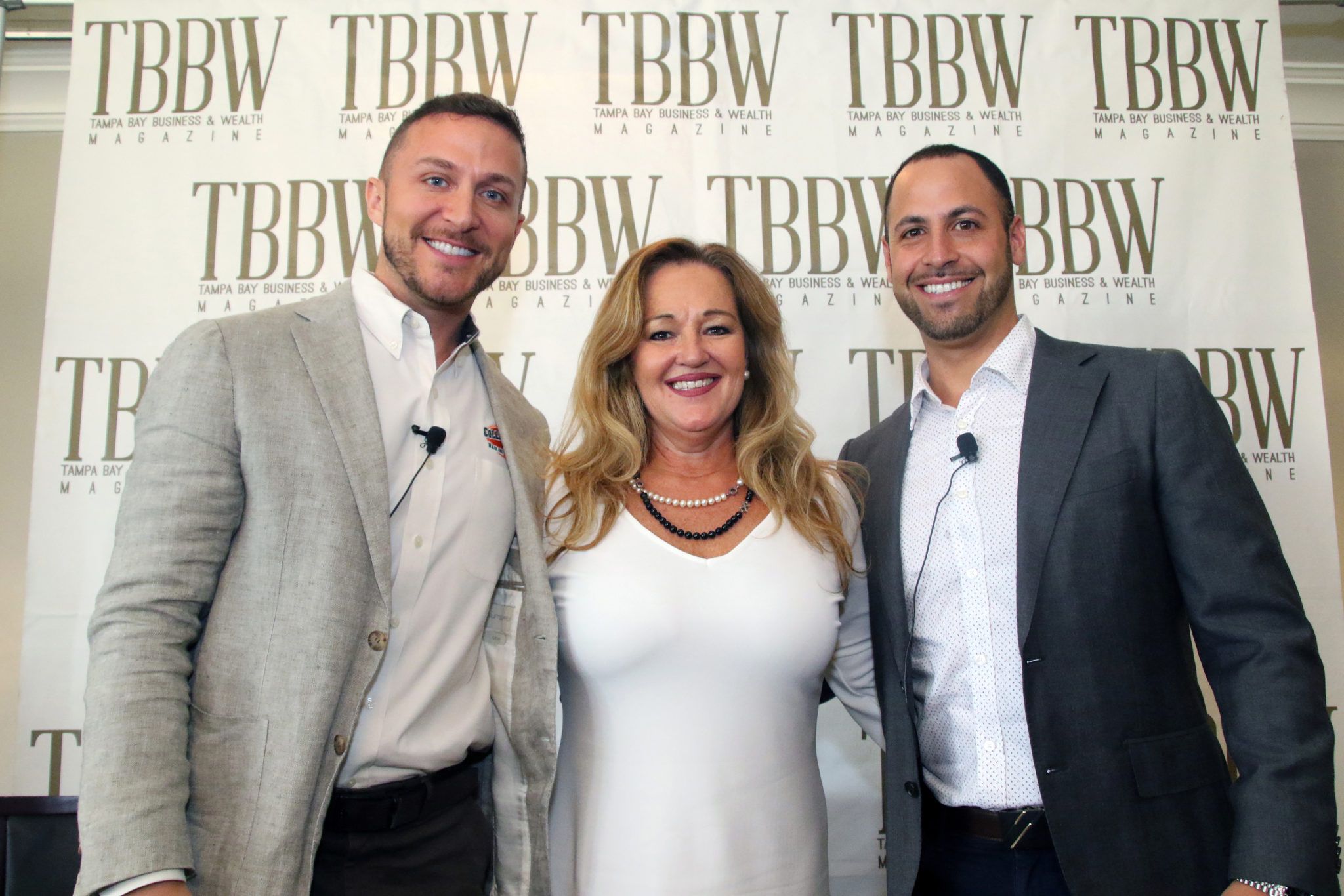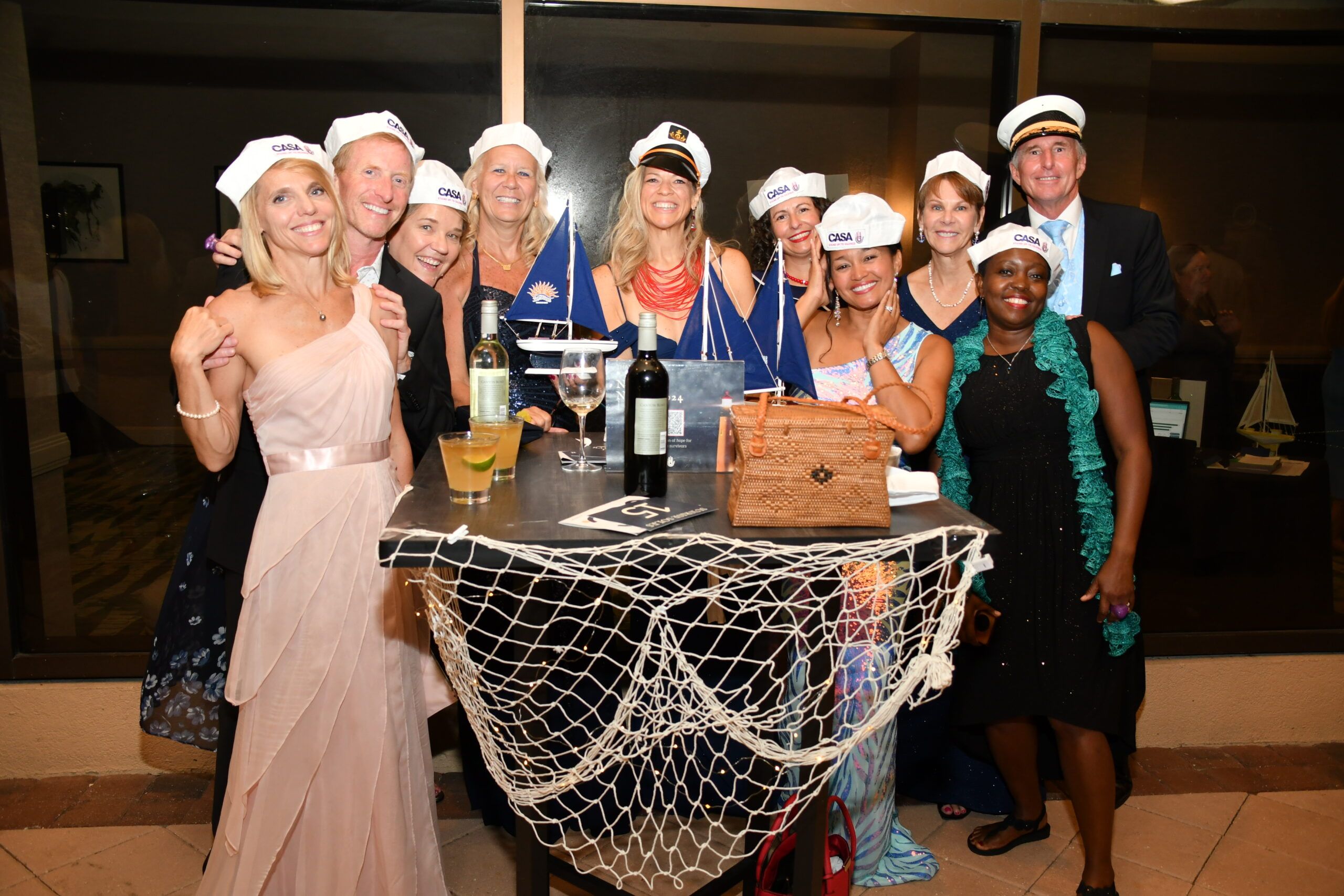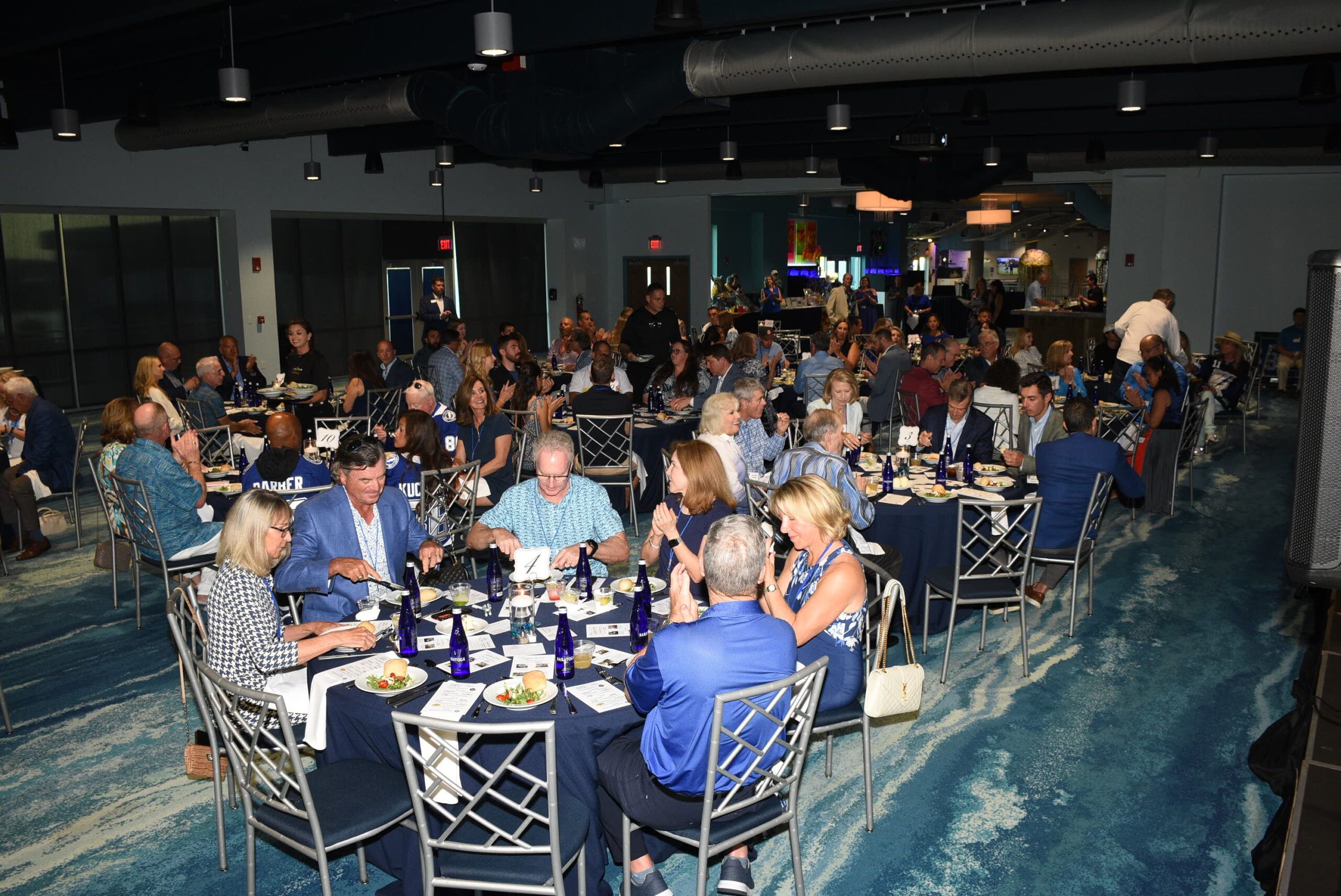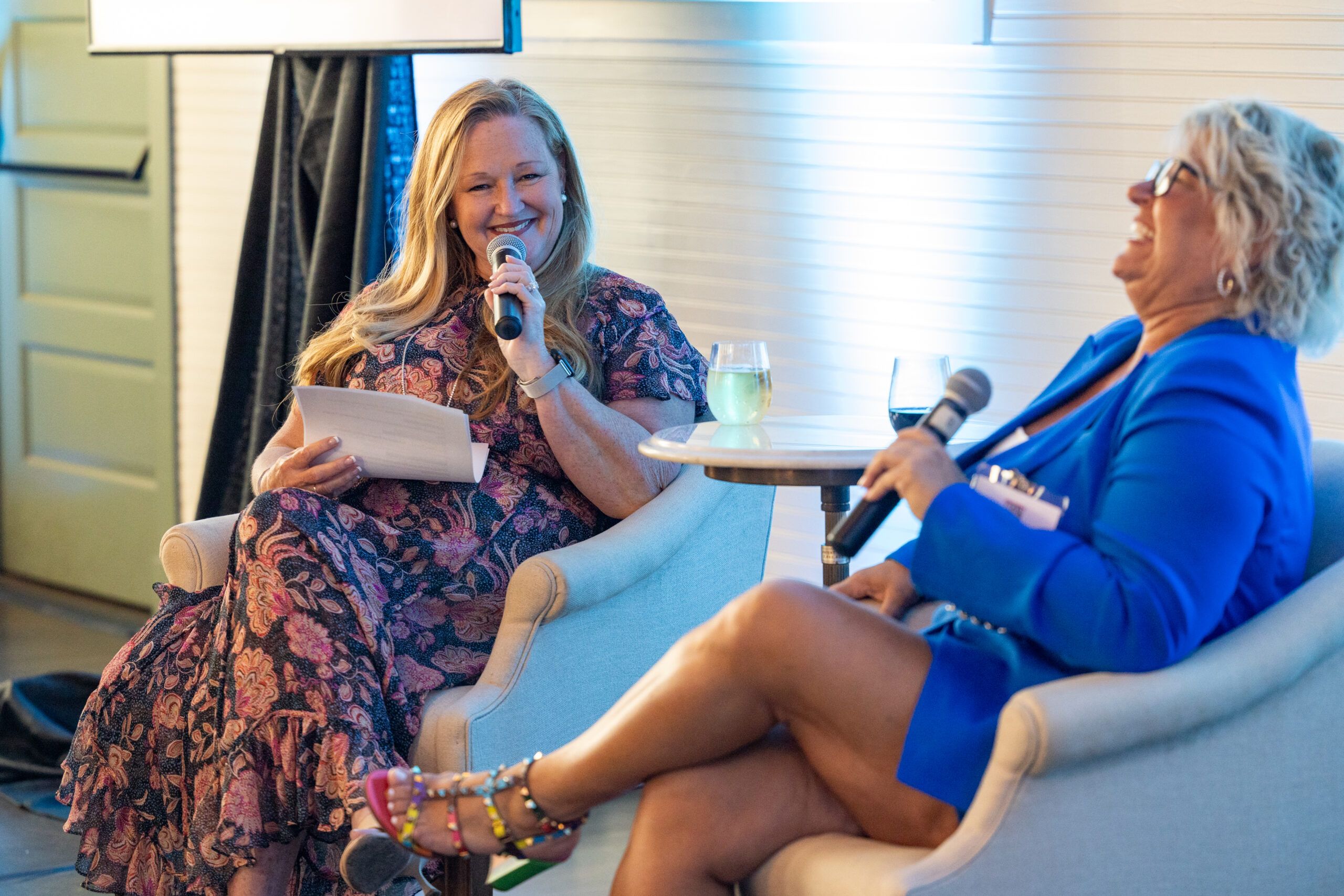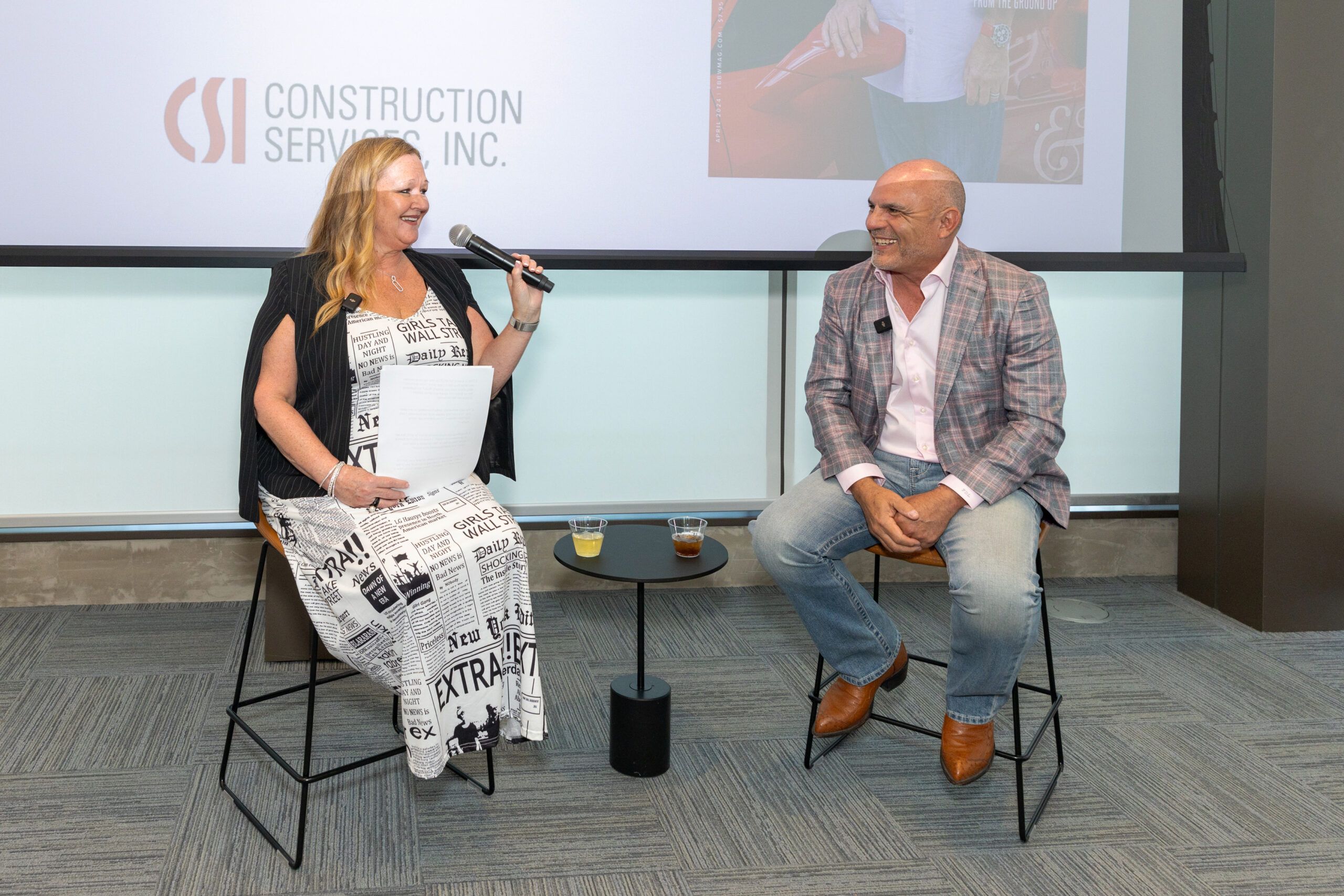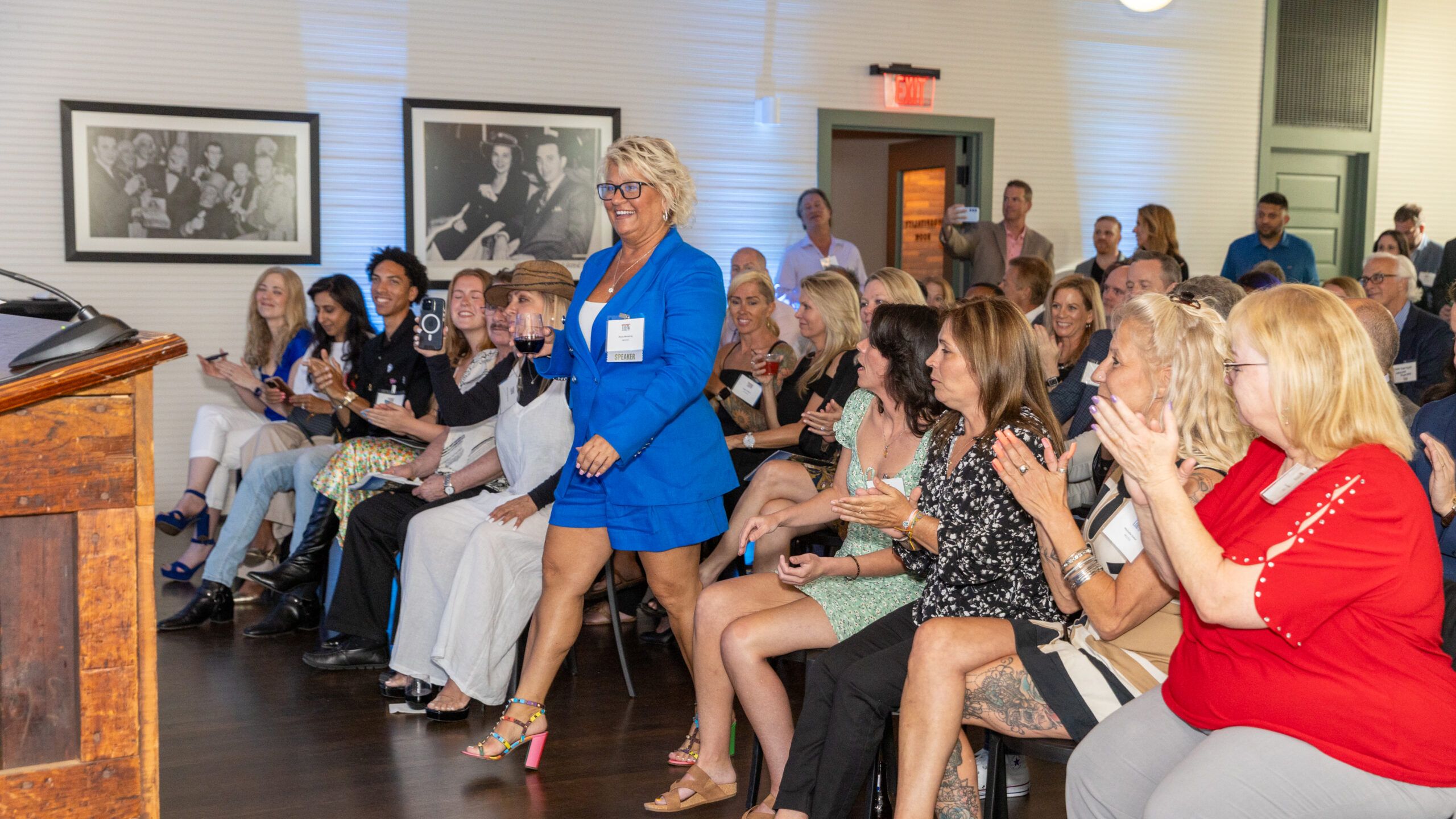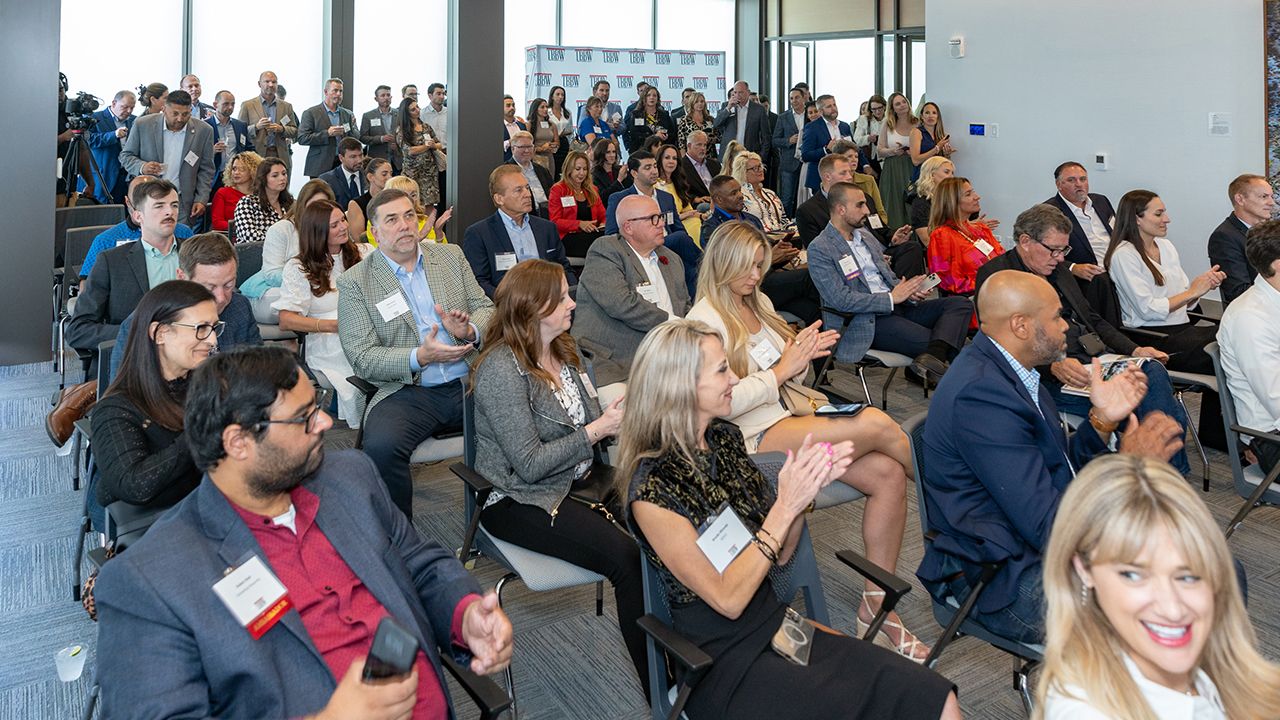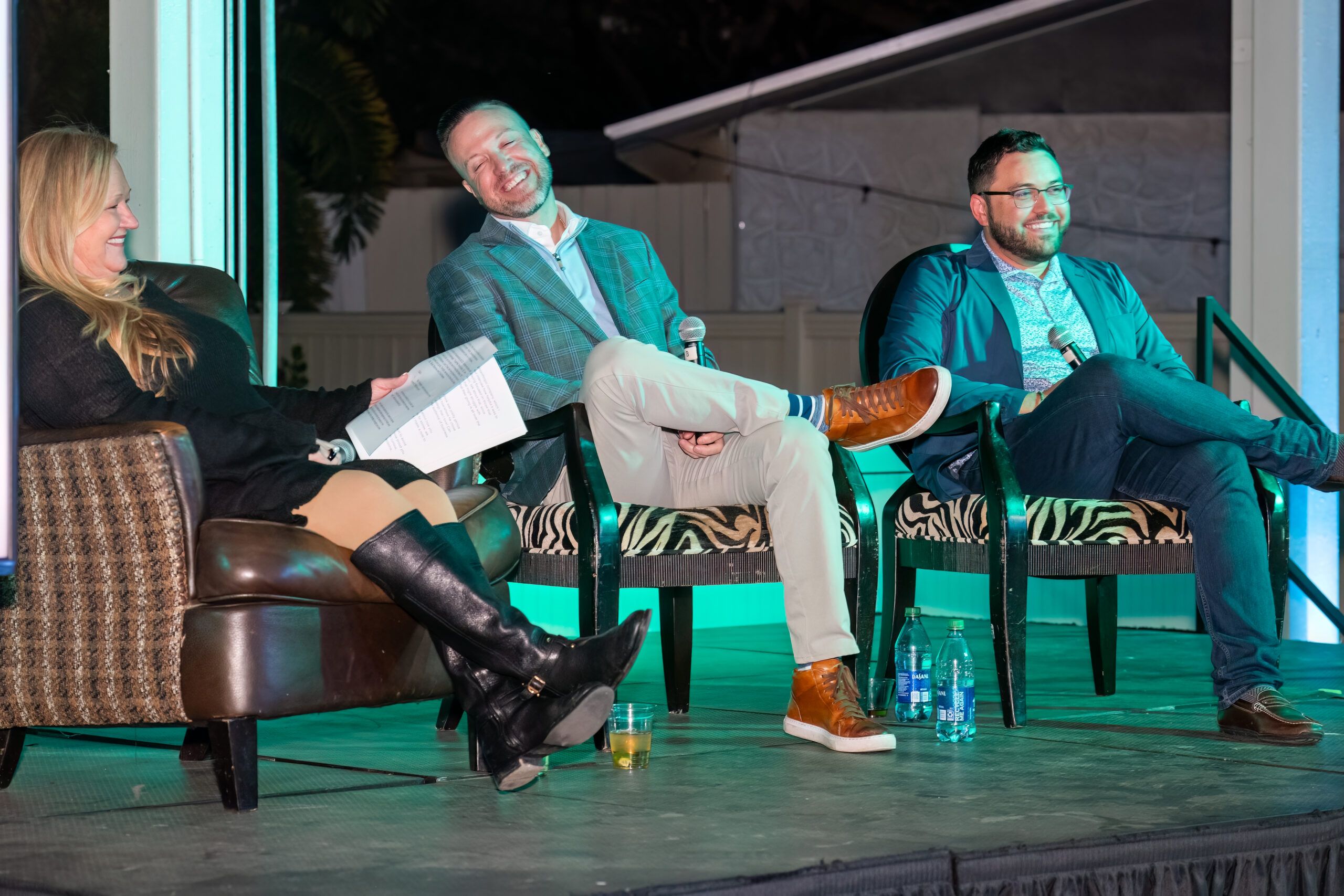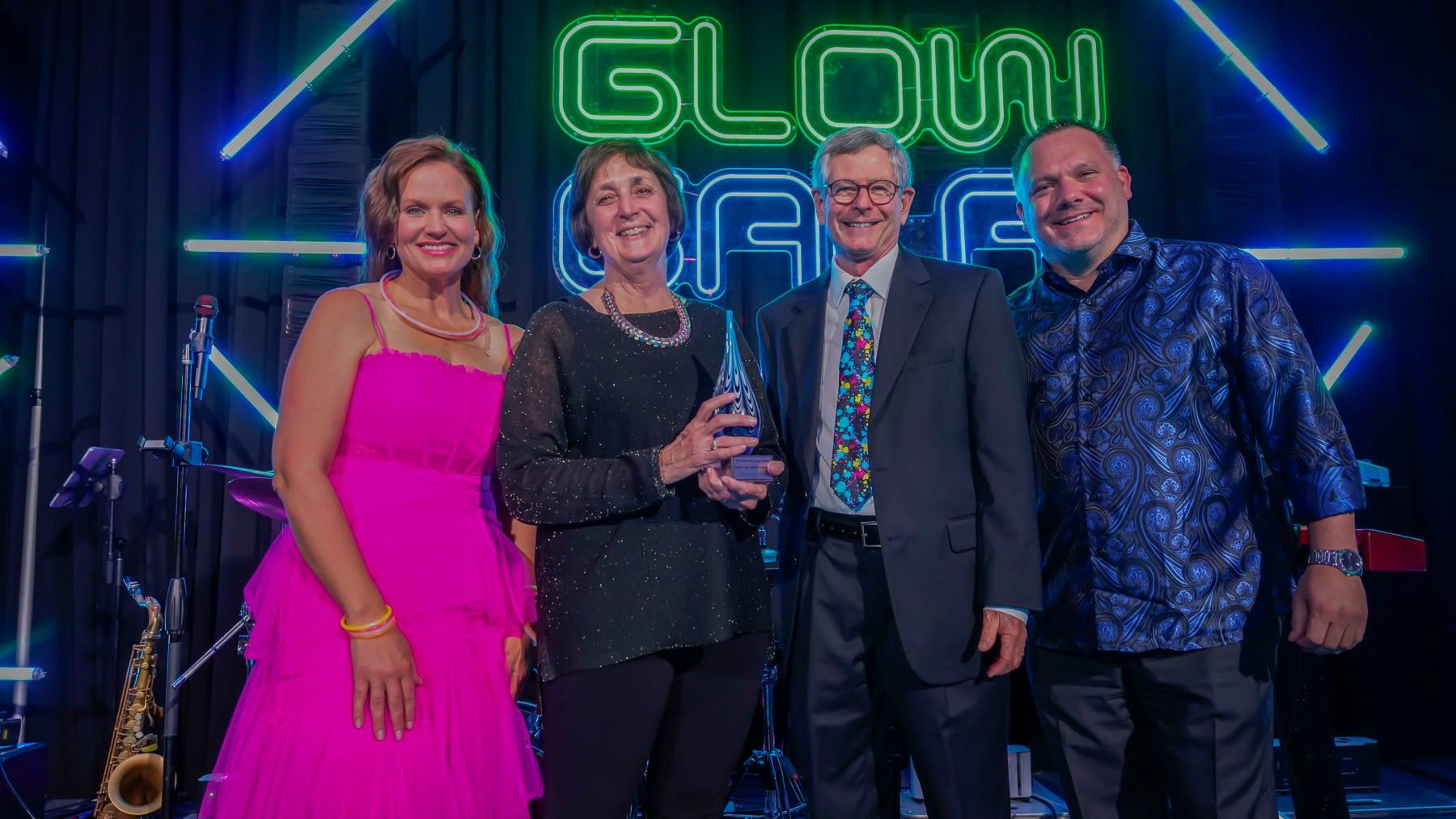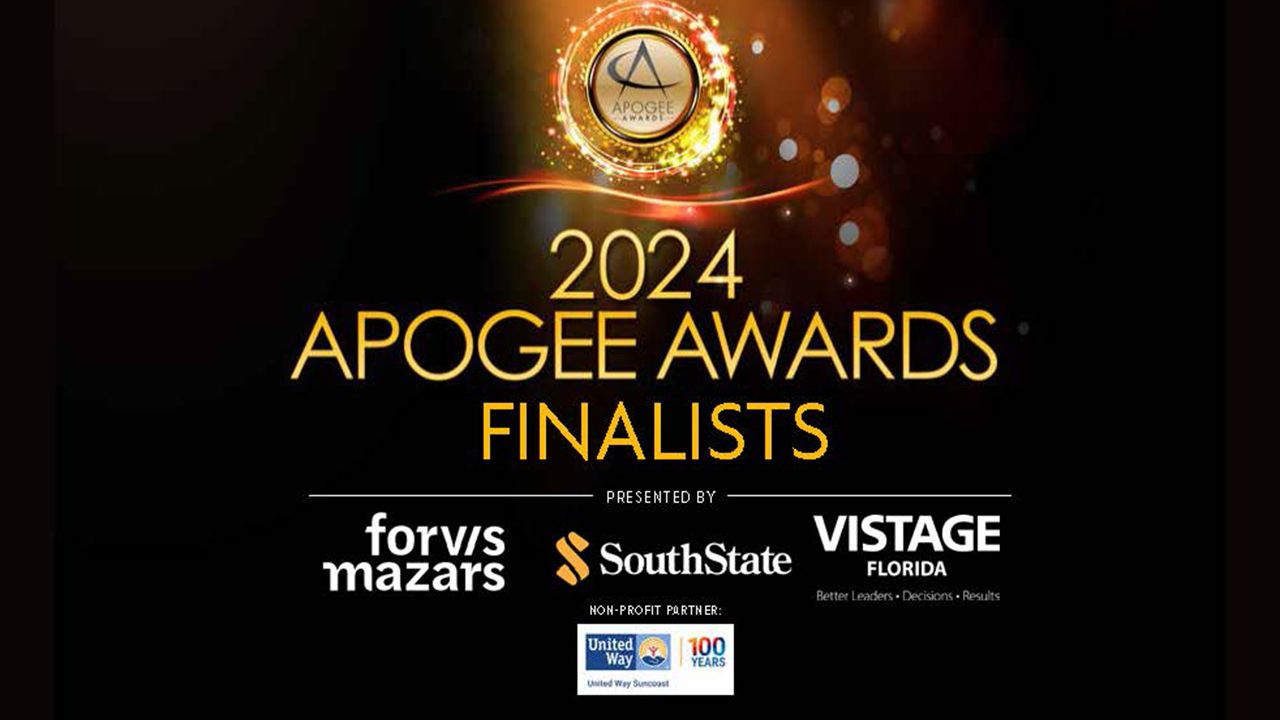College Hunks Hauling Junk and Moving has grown into a behemoth of a company since it was established in 2003.
It has corporate offices in Tampa and Washington D.C. and plans to add two to three more offices in the next year.
The company has 115 franchise locations nationwide and is expected to have $130 million in revenue for 2019.
All of this is in addition to growing the newest company: Trash Butler. In April, Florida Funders announced a $4.1 million investment for Trash Butler, which could be their next $100 million dollar company. Trash Butler is already operating in 25 states and in 2019 it’s expected to do about $7 million in revenue.
Bridgette Bello, CEO and publisher of Tampa Bay Business & Wealth, interviewed Omar Soliman, CEO and co-founder, and Nick Friedman, president and co-founder of College Hunks Hauling Junk and Moving, and Trash Butler, in front of a sold-out audience at the Centre Club. To view photos from the event, click here.
Here’s a recap of their discussion, which has been edited for clarity and brevity.
You guys were on the first “Shark Tank” episode. Nick, you bought your old house on HGTV’s “House Hunters.” You were both on “Millionaire Matchmaker.” Your media exposure up to this point has been insane. Where did you get the public relations and promotional knowledge that you have obviously mastered?
Nick: We always had this lofty aspiration to be a national brand. When we first started, about three months into our business, a Washington Post reporter called our number, which was on one of the little bandit signs you still see around town for gorilla marketing purposes. She said, “What is this College Hunks business? It sounds quirky. It sounds unique. Tell us the story.” Omar and I told her the story about how it started in college and we wanted to make it a real legit business.
She wrote an article about the company and it had an instant impact on consumer awareness in the D.C. area. We were like, “Wow, there’s something powerful about publicity and exposure to a consumer brand, from an awareness perspective.”
When the “Shark Tank” opportunity came along, we actually saw an advertisement in Inc. Magazine that said, “Looking for entrepreneurs to pitch a business idea for a TV show.” We didn’t know what the show was. We didn’t know it was going to become this great big success.
Omar: My mom said, “You don’t even scuba dive, why are you going to apply for this?” [laughter]
Nick: It was right around the time we started franchising the business. We thought [the show] could be a great way to get some exposure for the brand. At the time we weren’t actually thinking of getting an investment for College Hunks. We thought, “What could we pitch for a national television show?” We came up with a sister concept. We were going to call it College Foxes Packing Boxes. [laughter]
We sent in our pitch tape and got selected for the show. They ended up seeing through our facade of that business idea and wanted equity in the College Hunks business, which we turned down. But the impact of being on national television, the credibility it brought, it just extended itself.
As entrepreneurs we became a little bit hyper-focused on getting more and more publicity because it helped bring more awareness to the brand. We moved down to Tampa about 10 years ago when we started franchising. For a long time, our brand was much bigger than our business because of the exposure that we got. And that was probably the first five or six years of our business endeavor. Over the past five or six years, rightfully so, we have taken our focus off of trying to generate publicity hits and focus more on the business fundamentals and executing the business model. So now the business has finally caught up, and I think surpassed the brand. But early on we were just trying to get the name out there.
You mentioned “Millionaire Matchmaker.” That came as a result of being on “Shark Tank.” The producers reached out to us. We were single, at the time, and we were thinking, you know, we could leverage this from a publicity standpoint. [laughter]
I’m sure it was all about publicity for you guys. [laughter]
Nick: Omar drew the short straw on this. He ended up having to pick his date up in one of the College Hunks trucks and take her to the garage to haul junk, while I picked up my date in, I think, a red Bentley convertible and took her to a sushi dinner. It was great for television. We probably sold three or four franchises as a result of that.
The College Hunks grew up and have had an amazingly successful run over the last, 16 years now?
Nick: 2003 was the cargo van summer when it was unofficially in business, with just computer printout fliers, cell phone numbers and putting fliers in mailboxes. In 2004, we did the business plan competition and then 2005 was when we actually quit our jobs and started the business full scale. We always tell the story about how we were driving the truck, answering the phone, hauling the junk and we had the 800 number on the back of our truck that routed to our cell phones. People would call to complain about erratic driving and one of us would be the one in the driver’s seat. We fired ourselves at least three or four times that first summer.
Were you bored with just one $100 million company and had to start another one?
Omar: First off, I had more hair back then, so I wanted to lose more hair and start another company. [laughter] We started Trash Butler four or five years ago. We were looking for something that had recurring revenue and that was B2B. The way this service works is establishing contracts with apartment communities. We provide every resident with a small trash bin and our Butlers come out five nights a week and pick up the bag waste from the resident’s doorstep and take it to the onsite compactor. It’s very much an amenity for the residents.
Nick: Just to add to that, I think as entrepreneurs we had a lot of “chase the next shiny object syndrome” early on. And I think a lot of entrepreneurs have a tendency to have sort of that entrepreneurial ADD, which I say stands for “all damn day” because you can’t really turn it off. We made concerted efforts to stay focused on the College Hunks business. Once that business got to a point where we had a true executive team and management team, where Omar and I could elevate our role into a more visionary owners’ box, where we’re not as involved in the day to day decision making or operational decision making, then we could set our sights on a different business.
The Trash Butler business was incubating on the side and we realized that there was a big opportunity with it. There’s a lot of cross pollination between Trash Butler and College Hunks because with these apartments, they have 60 percent turnover every year. So that’s 150 people moving out, 150 people moving in, of every single apartment building. And those people will need movers and junk haulers.
That was a piece of advice I think John Sykes (founder of Sykes Enterprises) told me when I sat down at dinner with him a while ago, “If you’re going into other businesses, make sure that they integrate well with your core business and that you’re not doing one thing over here and one thing over there that just has nothing to do with the other.” The businesses should complement each other so you can leverage your resources, your people and your systems. And as Omar mentioned, the recurring revenue is what really appealed to us.
For the business owners, CEOs, founders and presidents in the room, what I’m hearing you say is it was transformational when you let go of the wheel and hired somebody else to run your baby.
Omar: The key for any business is to work on the business and not in the business. And when you can elevate yourself into that owners’ box and treat the business like an asset and not like a job, that’s when you can really get that exponential growth.
Talk about your partnership. How does it impact the business, both positively and negatively?
Omar: We met in detention and at the time, he was on the basketball team. I was watching a game, the ball got out of bounds and Nick got tangled up with the opposing team’s mascot and ended up punching this giant frog in the face. I remember thinking to myself, I really like that guy. We’ve been best friends ever since.
The key for us is we have a shared vision, a shared purpose and shared core values. That’s been our guiding light. We disagree, fight and bicker, sometimes like an old married couple, but when we have those disagreements, we, we can get past them. I think we complement each other with different skill sets. The positives outweigh the negatives.
Nick: No matter how we disagreed on certain tactical or strategic elements, it was always that we wanted to grow this great brand—be known for being a purpose-driven, value-based and socially conscious company. I think that’s the same for any business, or non-business, relationship having those shared vision values and being able to communicate and not take things personally. We hold each other accountable.
Culture is a big part of what you promote and what’s important to you. I would like you to talk about where that was born and why that’s such a big deal.
Nick: I give Omar the credit for this one. Coming out of the recession was probably the most challenging time for us businesswise. As soon as we started franchising the housing market started to tank and things became a lot more difficult. It’s like we were dragging the anchor through the sand and Omar said that we needed to focus on company culture. He said a business without a culture is like a picture frame without a picture inside of it.
At the time, we didn’t have a really good internal company experience for our employees and our franchise owners. We want them to be truly loyal, through the ups and downs, no matter what and have them committed to the long-term vision. We got really intentional on our company purpose that Omar came up with was to “move the world,” which is obviously a double meaning. We want to move people emotionally too.
One of the mantras we have is, “it’s not what’s on the walls, it’s what’s in the halls.” A lot of companies have a nice set of core value statements or mission statements, but they don’t really use it for how they operate and conduct themselves or who they let into the organization. That became intentional and fundamental as our overall company architecture that has led to our success and keeps us attracting really good people. ♦
ABOUT CEO CONNECT
TBBW’s “CEO Connect” series is an exclusive, invitation-only, monthly event that brings together the Tampa Bay area’s top business leaders to meet and mingle. Presenting sponsors for June’s event included CLA, Concertium and Foley & Lardner. Gold sponsors were Provise and Valley. Hospitality sponsor was the Centre Club.
Typically, the evening begins with a cocktail reception for about 120 guests, followed by an interview of that month’s cover CEO, providing insight into their lives, careers and views on issues affecting the business community. The interview is conducted by Bridgette Bello, TBBW’s CEO and publisher.
Partnering with TBBW on the event provides an opportunity to network with the area’s business elite, generate new business opportunities and increase brand awareness.
For information about event sponsorship opportunities, email Jason Baker at [email protected].



